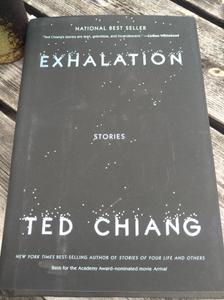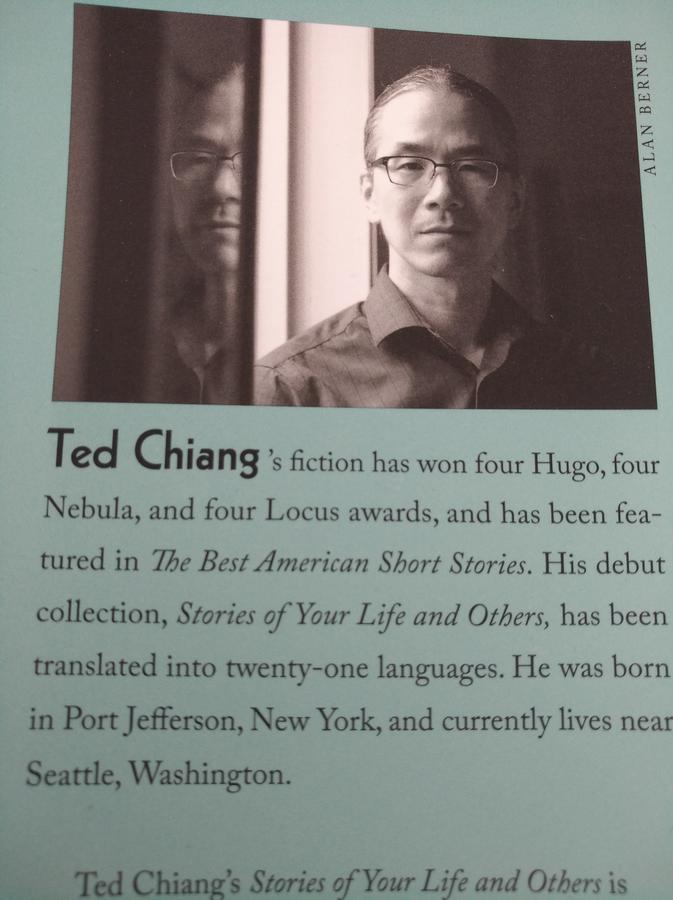Books - Read and Enjoyed
Exhalation
Alfred A. Knopf, 2019
by Ted Chiang

Like in the collection Stories of Your Life, that I reviewed earlier this year, in the stories of Exhalation Ted Chiang explores the weird consequences of odd assumptions in compelling, sometimes thrilling stories. These assumptions are either not yet in place but plausible in the future, or obviously incorrect but accepted at some point in history, or have always been implausible but fascinating nevertheless.
In “The Truth of Fact, the Truth of Feeling” Ted Chiang explores how memory assistant technology changes the way we perceive history and experience our own memories. He does it in two interwoven stories, one playing in the past, the other in the future. The one in the past is told from Jijingi’s perspective, a thirteen year old boy from a village in Tivland, in today’s Nigeria, at the time when Europeans had come to the area and changed the ways how the Tiv people lived. One of the things Europeans brought with them was writing. Jijingi learned writing from a missionary and thus became secretary of Sabe, one of the clan elders. One of the things Sabe had to discuss and, together with elders of other clans to decide, was, with which other clans they should join in order to simplify administration. A sensible decision had to be based on where clans originated from and how they were related. The clan elders had a view of those relations based on their own memories and on what had been related to them from their ancestors. But when Jijingi looked up the written record of the Europeans, it did not match quite the understanding of the clan elders. The dispute was complicated by the fact that it was not only a matter of factual history but also of similarity of values, life styles, and customs.
The story of the future follows the impact of lifelogging and Remem. Remem is a visual search algorithm that allows to find relevant video sequences in exabytes of video streams within milliseconds. For people who make lifelogs with their spectacle integrated cameras, Remem smoothly gives answers to questions like, “where did I put my keys in the morning?” or “what was the name of the Greek restaurant we visited in our vacations ten or twelve years ago in California? Or was it Florida?” But the more impact-full questions were when partners quarrel about who had said what in an argument a day or a month ago, how exactly one had offended the other, and why one had been misunderstood by the other. Remem mercilessly uncovers that our own memories are greatly distorted and has the potential to fully unravel our perceptions of ourselves and others. While Remem contributes to a more faithful understanding of our own behaviors, it also seems to foster small-minded, petty fighting about who is right and who is wrong. Hence, not everybody embraces its use and some find its benefits limited and its overall effect harmful. But in the story at hand the narrator uncovers, with Remem’s help, an inconvenient truth about his relation with his daughter. He had been estranged from his daughter years ago and the way he remembered the reasons and mechanics of this estrangement turned out not to be quite in line with the facts.

In other stories Ted Chiang explores how our avatars develop when they learn how to learn and the virtual and the real world starts to merge (“The Lifecylce of Software Objects”), or how science might have developed if the Bible’s claim that God created the world some 7000 years ago were found to be correct (“Omphalos”). “Anxiety is the Dizzyness of Freedom” studies the effects a device called prism, for “Plaga interworld signaling mechanism” might have. Given that the multiverse theory is true and the world splits in every moment in an uncountable number of multiverses and they quickly diverge from each other due to small initial differences in quantum fluctuations, prism allows to keep contact with one of the other multiverses, at least for some time. As the prism technology develops, the amount of information that can be exchanged between two connected multiverses grows, from a few bits in the beginning to entire video calls after some years. Given prisms growing capabilities, people start to wonder how their selves developed in other multiverses, if they made similar choices, if their para-selves were as lucky or unlucky as themselves, or if they had met the same partner and raised the same children.
Each of these stories is a gem and delves into fascinating questions that all have, but looked upon from a radically new and unexpected angle.
Ted Chiang (his Chinese name is Chiang Feng-nan (姜峯楠)), born in 1967 in New York, is the son of Chinese parents who migrated via Taiwan to the US. A Computer scientist by training he started to write science fiction stories already as teenager and has now won several awards for his lucid, sometimes magical stories. The movie Arrival is based in his “The Story of Your Life”, which by itself is fascinating even though it deviates significantly from Chiang’s narrative.
(AJ Juli 2020)
